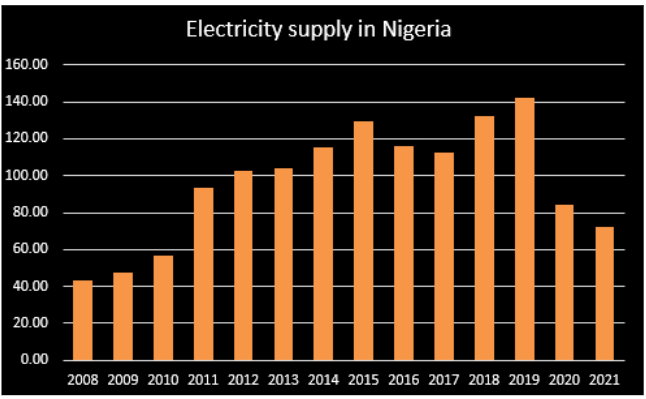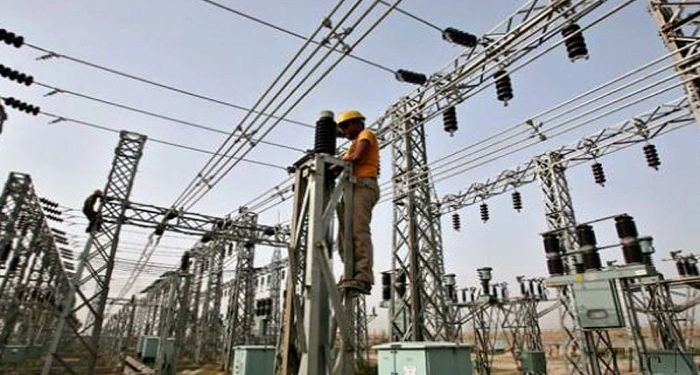Nigeria generates $72m from exportation of electricity in 2021
Nigeria generated a sum of $72 million from electricity export in 2021, a naira equivalent of N29.95 billion, using the official exchange rate of N416/$1. This is according to data from the Central Bank of Nigeria.
The amount generated in the review year represents a 14.5% decline compared to $84.26 million recorded in the previous year and 49.4% drop as opposed to the $142.3 million received as payment in 2019.
In the past five years, Nigeria earned a sum of $543.11 million from electricity export to neighbouring countries, such as Niger, Benin, and Togo Republic. Nigeria continues to export power to neighbouring countries despite continuous power outages in the country as a result of recurrent grid collapses.
It is worth noting that Nigeria’s electricity export in 2021 only accounted for 0.16% of the total $45.92 billion export earnings in the period under review. At $72 million, Nigeria recorded its lowest inflow from electricity export since 2010 (11 years) in the review year.

Nigeria’s national grid has collapsed several times this year already, with the recent disruptions occurring last weekend, which caused blackouts in some areas of the country, as total energy generation plummeted to 37,964.93MWh on Saturday, 9th April 2022.
According to the World Bank, 85 million Nigerians do not have access to grid electricity, representing about 43% of the country’s population, which effectively makes Nigeria the country with the largest energy access deficit in the world, yet Nigeria still carry out cross-border electricity trades.
Similarly, the World Bank also noted that the lack of reliable power has resulted in an annual economic loss estimate of $26.2 billion, representing about 2% of the national GDP. Furthermore, the World Bank Doing Business Report, places Nigeria at 171 out of 190 countries in getting electricity, which is seen as one of the major constraints for the private sector.
Why the decline
Nigeria is endowed with large oil, gas, hydro, and solar resources, and it has the potential to generate 12,522 MW of electric power from existing plants, according to information from Power Africa. On most days, Nigeria is only able to dispatch around 4,000 MW, which is insufficient for a country of over 200 million people.
- Nigeria, the largest economy has found it hard to generate at least a daily 105,000MWh, which would be a desirable level of supply if Nigeria is to have a relatively stable power supply.
- With multiple grid collapses causing blackouts in most parts of the country, the target seems further away from sight.

- While the recurring disruption in our various grids is plunging into our ability to improve power supply in the country, the Nigerian Electricity Regulatory Commission (NERC), reported last year that three West African countries, which import power from Nigeria were yet to pay for imported electricity.
- Notably, the agency reported that the power firms of Benin, Niger, and Togo, alongside some other special customers were issued a total bill of N770 million by the Nigerian Bulk Electricity Trading Company and the Market Operator of the Transmission Company of Nigeria (TCN), none of which had been paid as of Q2 2021.
Why this matters
Power is a fundamental need of businesses and households, which very pivotal in the development of any economy. However, Nigeria being the largest economy on the African continent with over 200 million people still grapples with power supply problem, with recurring grid downtime and consequently power outages.
Whilst this has become the undesired reality of most Nigerians, electricity export, which is also a source of FX for the Nigerian economy has also taken a hit in the past two year. This is likely to contribute to the further FX crunch in the economy as other channels from which forex flows into the economy has been disrupted in recent times.









Nigerian citizens are undoubtedly experiencing emotional disturbance with this recurrent power outages. Though frequency of power outages has become a norm, it is clear that power as a fundamental need of households and businesses is indispensable.